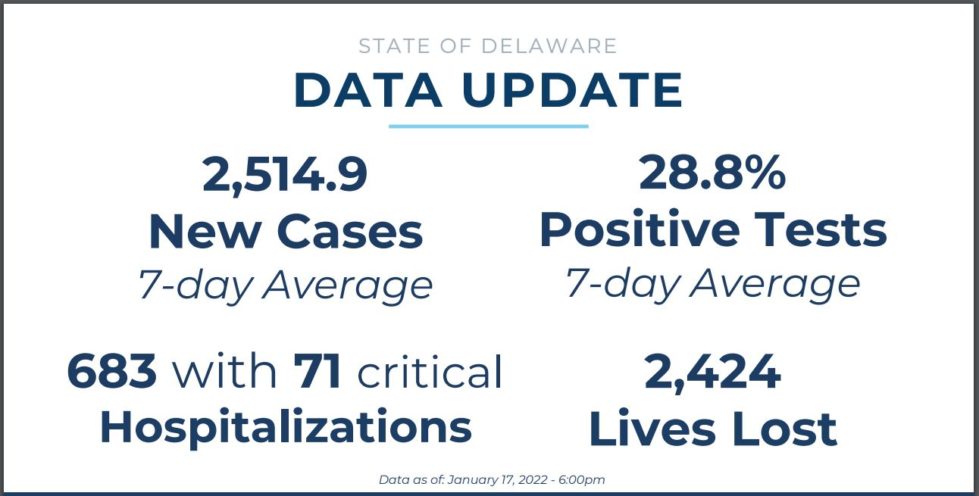New COVID-19 cases in Delaware seem to have plateaued and maybe even dropped a bit, Gov. John Carney said during a Tuesday press conference.
In recent weeks, new cases often were in the upper 2,000s or into the 3,000s.
As of Monday, the state was seeing 2,514.9 new cases per day over a seven-day average, a drop from most days last week.
The percent of positive tests also has dropped slightly to 28.8% of the total tested, down from 30.1 and higher last week.
The state also has 683 hospitalized with 71 in critical condition. Last Friday, the number of hospitalized was 729.
“The hospitalization number (is) down from 759 on Jan. 12,” Carney said. “That’s positive news. We don’t want to prejudge anything for the long term with just a couple days data points. Coincidentally, it’s the same day, Jan. 12, as our peak last year, which was Jan. 12. We’ll see whether that holds true. but we’re hopeful. Obviously we’ve also seen a leveling off in new positive cases And , importantly, a slight reduction in the percent positive.”
“We are pleased to see that our case and hospital rates are not increasing as at the same rates that we had been seen in the previous few weeks,” said Dr. Karyl Rattay, director of the Division of Public Health. “However, our case rates and our hospital rates remain extremely high. And so, this is definitely not the time to let our guard down with Omicron and also there is more we need to do in preparation for future variants.”
Rattay said that random genetic testing of some positive cases showed that the Omicron variant is responsible for 93% of the positive cases.
She also encouraged booster shots saying they prevent infection, serious illness and hospitalization. Only 30% of the Delawareans who were eligible for them had gotten them, she said.
Of those who are fully vaccinated and end up in the hospital, 91.4% have not had booster shots, she said.
Booster shots help by increasing immunity. Moderna says that it’s booster shots increase antibodies against COVID 37 times and Pfizer said theirs increase antibodies 25 times.
Some national studies say the protection of a booster shot falls rapidly in the months after receiving it.
Rattay pointed to Israeli studies published in the Journal of the American Medical Association that said people who are fully vaccinated with two Modern or Pfizer shots, or one Johnson & Johnson have a 90% to 95% protection against serious illness or death, while those with boosters have closer to 99% to 100% protection against it.
Omicron can beat the vaccines partly because it keeps mutating and the antibodies don’t recognize it, she said.
“The current COVID vaccines target the spike protein on the COVID virus, and the Omicron variant has many mutations on the spike protein which helps it evade antibodies which are generated from both prior infection or the two-dose vaccination,” Rattay said. “So with Delta, the antibodies from the vaccine or from prior infectionoffered more protection against the infection. We’re seeing that’s less the case for people fully vaccinated or who’ve had prior infection as it relates to preventing Omicron infection.”
Also covered in the press conference:
- The state will send 125,000 KN95 masks to educators, students grades six and above, and childcare providers across the state. Districts, charter schools, private schools, and child care facilities will receive KN95 masks to support in-person instruction. Schools and child care facilities will make the masks available to staff members as needed or requested. The masks will be distributed based on the number of staff across all schools and number of students in sixth grade and up due to the size of the masks. The state was not able to get smaller masks that would fit kindergarten and elementary school students’ faces
- Asked why the state wasn’t provided masks to all residents, as some states have, Carney said the state has no plans to provide masks to everyone. “We did decide to focus on our schools because it is our highest priority to keep children in schools.” They know schools are generally safe, but the masks will help prevent the spread. In addition, he said, lots of testing is being done in schools to keep students and staff safe and in the classrooms. “We know that’s challenging for many schools and districts, because staff and teachers are testing positive enough to sit on the bench, but we’ll continue to focus on that that high priority.”
-
While the number of cases and hospitalizations seem to have stopped their dizzying rise, the number of people being tested for COVID-19 has remained high. Last week, 62,323 covid tests were administered, up 1,200 from the week before. To help people get tests, the state and the Federal Emergency Management Agency has opened a drive-thru facility at the Delaware City DMV open Monday, Tuesday, Thursday and Friday from 5:30 p.m. to 11:30 p.m.; Saturdays from 8 a.m. to 4 p.m.; and Sundays from 10 a.m. to 6 p.m. Advance registration is required at doIneedacovid19test.com.
- The Centers for Disease Control and the Division of Health said that people need to reconsider their masks. The best to choose are tight-fitting ones that make a seal on the face, similar to KN95s. Cloth masks do not filter the virus particles as well as hospital masks, and while a hospital mask has more layers to trap the particles, a KN95 mask may be best. The state offered this graphic describing how to choose and what to do.

- The officials also asked Delaware residents to consider volunteering at hospitals to help ease the burden. Last week many were above capacity in both the regular beds and in intensive care units. To volunteer, they said, go to deha.org/hospitalhelp and fill out the form.
- Free COVID-19 at-home testing kits are now available from the federal government. To order them, go to covidtests.gov.
Share this Post





